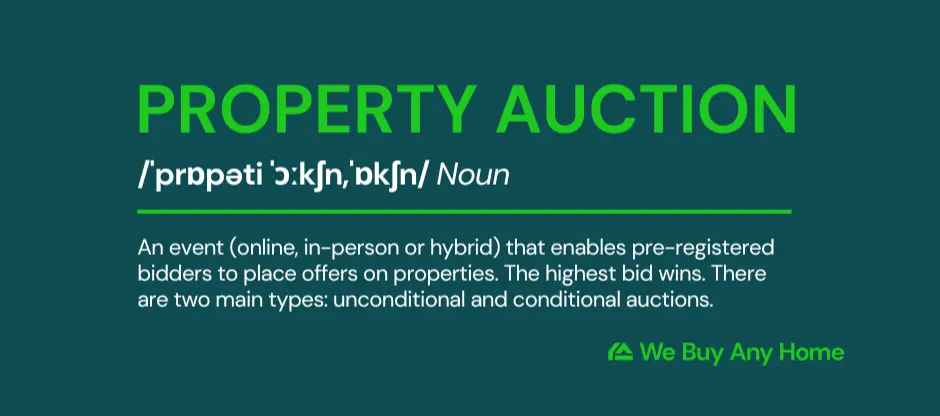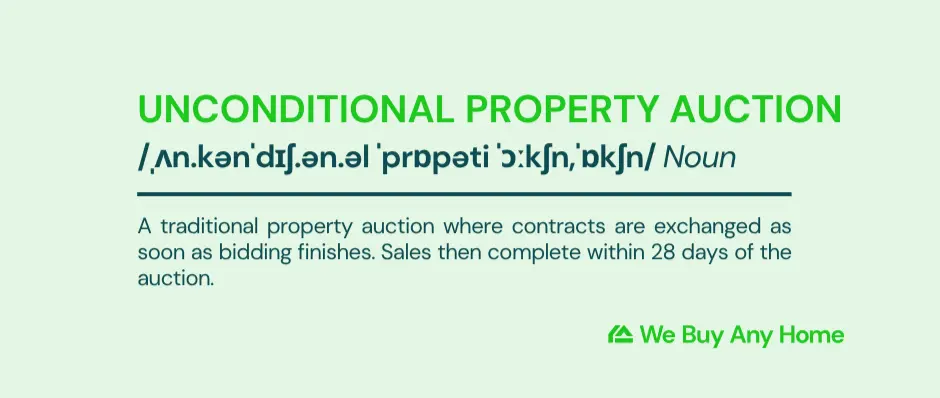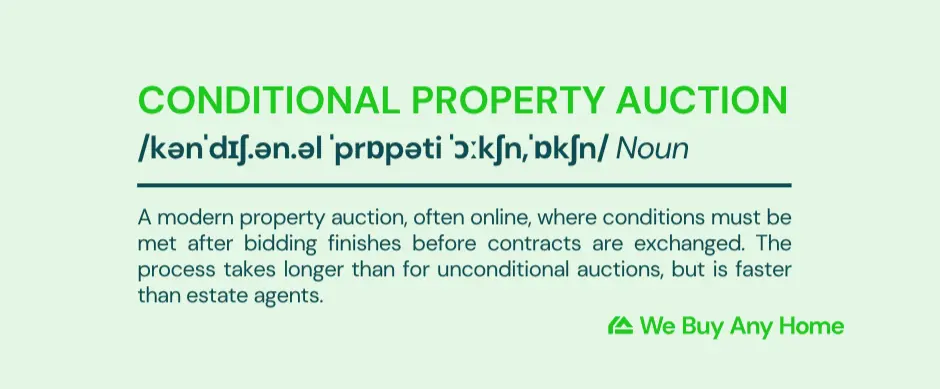Approximately 20,000 homes are sold at auction in the UK every year.
This equals around 2.2% of all property sales in the country.
They bring distinct advantages and disadvantages, depending on the situation.
But what are the different types of auction? How do they work? And how can you ensure you have the best chance of successfully selling your property at auction?
Let’s explore these questions and more.
Property auctions: Definition

Property auctions are events that enable pre-registered bidders to place offers on the properties. The person with the highest bid at the end of the session wins.
Modern property auctions date back to 19th century England. They have gradually become more popular as homes and the property industry have changed.
Today, there are a few hundred property auctions in the UK. They can be divided into the following two types:
1. Unconditional auctions

At unconditional auctions (sometimes known as traditional auctions), sales are initiated once bidding has officially finished.
Once the auctioneer brings the gavel (small wooden hammer) down, the property’s contract is exchanged.
In other words, there are no conditions around whether sales will complete at this point. They are completed within 28 days of the auction (i.e., 20 working days, excluding bank holidays).
For this reason, most buyers at auctions are cash buyers.
Unconditional auctions are typically held at ‘in-room’ at physical auction venues (as opposed to being online).
But bidders can often participate via phones, computers or proxies (individuals who stand in for them). And some are held exclusively online.
In-room, in-person unconditional auctions were the standard form of property auctions until relatively recently. Technology has changed this.
How unconditional property auction houses work
In most cases, a property auction house arranges open viewings of any house being sold in advance.
Potential bidders can view properties in the weeks before the auction, often in an open viewing format.
Those interesting in making bids then arrange a property survey.
Then, whoever makes the highest bid on the auction day will usually be expected to make a 10% deposit before making a final payment.
With some auction houses, it is possible to bid without being physically present on the auction day.
You must contact the auction house in advance. They may offer ‘telephone bidding’ or ‘proxy bidding’.
Once a bid is accepted, that individual is legally required to purchase the property.
Time frames
The typical unconditional auction process usually takes 8-12 weeks, made up of:
- 2-week preparation period: To register, receive legal documents, and list a property
- 6 weeks marketing period: Potential buyers to view the property and arrange surveys (which they – not auction houses – pay for)
- 1 day auction: This takes about 6 hours overall, and 10 – 15 minutes for a given property. Contracts are exchanged and a deposit is made on the same day
- 4 weeks completion: The full funds are transferred.
Costs & fees
Most auction houses charge a flat entry fee to list your property. They then then take a commission on the final sale price.
Several online sources indicate that the typical auction house commission rate for property is 2%. Value-added tax (VAT) is often charged on top of this.
The flat rate will vary depending on the organisation you use – it can be anywhere from £150 to over £1,150.
If you have any questions, contact a specific Auction House and ask them for a clear overview of their rates.
In an ideal world, auction houses won’t have a penalty for sellers who drop out (a withdrawal fee).
Auction atmospheres
Auctions in general are known for their fast-paced and exciting atmospheres.
In unconditional auctions, the dynamics of the auction room itself can contribute to this. But conditional auctions online aren’t immune to a similar effect!
This can lead to tense bidding wars that benefit sellers by driving up prices. The other side of this is buyers getting carried away and bidding too much.
Attending before participating
It’s generally possible to attend a property auction without needing to register.
(To participate – especially at an unconditional auction – often requires a sign-up and proof of funds in advance.)
So, it’s recommended buyers and sellers attend a property auction before participating in one.
However, many who choose auctions are hoping for a quick sale, so don’t have the luxury of attending another auction beforehand.
Guide & reserve prices at auctions
In property auctions, a guide price is the rough amount that an item will be sold for. It’s to steer potential buyers, but it’s not binding.
They are usually suggested by auctioneers, who analyse property and market conditions before agreeing it with the seller.
By contrast, the reserve price is the minimum amount the seller is willing to accept, which they alone should decide. Bidding starts at this figure.
Buyers’ goals
Many property investors and developers are attracted to buying a house at auction.
They are often aiming to spot a property with huge renovation potential to flip.
And in most instances, a buyer must pay for a survey for a property they want to bid on.
Preparing for selling at auction
Sellers at auctions are often guided by auction employees.
Once an auction house has approved a seller’s participation, the next steps are as follows.
In an ideal world, auction houses won’t have a penalty for sellers who drop out (withdrawal fees). However, some do charge these.
1. Catalogue information
These are the equivalent to listings on the open market. Sellers need to provide basic information and photographs of properties, including:
- It’s guide price
- Key features
- Notes on issues that may effect buyers (planning permission, structural issues, etc.)
- Floor plans.
These catalogues used to be printed, but now they are often pdfs or website pages.
2. Legal Pack
Legal packs are essentially all relevant legal documents needed for selling a property.
When selling on the open market, these are often gathered during negotiations, i.e., after marketing and viewings have taken place.
However, the speed of auctions means that having them available early is essential. They may vary for different properties, but in general, they will include:
- Title deeds
- Information on freeholds or leaseholds
- TA10 (fixtures and fittings) form
- Documents relevant to planning permission issues or applications (if applicable)
- Tenancy agreements (if applicable).
And more.
3. Addendum
Addendums are notifications of any changes to property’s conditions or statuses after catalogues and legal packs have been created.
They can also be used to signify any special conditions sellers may have. For example:
- Higher or lower deposits (than the norm of 10%)
- Additional fees
- Payment method requirements.
And more.
Addendums should be made clearly accessible besides other property information. They also overwrite other information.
Advantages of selling at unconditional property auctions
Speed
Auctions are much faster than selling on the open market.
After all, if the property is priced fairly and marketed well, offers can come on the same day it goes ‘live’ at the auction house.
Flexibility on property condition
Auction houses help sell properties that would require more work to find a buyer on the open market.
You can still complete a sale at auction if there are issues such as:
- Property in a bad condition (including issues with its structure)
- Disputes with neighbours (including over land issues)
- Sitting tenants.
Certainty after bid completes
Unconditional auctions provide a relatively high level of certainty sales once bidding is over.
This is due to a combination of buyers using cash and sellers being outside property chains.
Disadvantages of selling at unconditional auctions
Reduced price
However, it will often be at a significantly reduced price.
(The main exceptions come when there is high potential in the property and bidding wars lead to selling prices exceeding guide prices.)
Uncertainty before bidding is finished
Sellers can set reserve and guide prices (see below) in advance. And buyers have budgets and can set themselves maximum bids.
However, not all properties sell at auction. And for those that do, final selling prices can be unpredictable.
This is the nature of bidding!
2. Conditional auctions

Conditional auctions (sometimes called modern auctions) are online auctions where sales must meet set conditions after bids complete.
These auctions give buyers and sellers a longer time frame complete a sale than unconditional ones.
However, sales are still quicker than via estate agents on the open market.
How conditional property auctions work
Conditional property auctions are relatively new. So, some details of their processes might vary slightly, though generally speaking the broad outlines are the same.
Potential buyers bid for properties online without having already given a deposit.
The highest bidder then pays a fee and enters a reservation (or exclusivity) agreement with the seller.
Unlike at an unconditional auction, contracts are not exchanged at the end of bidding. So, sellers don’t have as quick and certain a sale as they would at unconditional auctions.
However, the longer time frame to complete sales gives sellers access to a wider range of potential buyers. This is because the latter how more time to finance their purchase.
Time frames
Conditional auctions typically take 12 – 16 weeks to complete.
Their time frame is similar to unconditional auctions, except that sales have 28 days to exchange contracts and then a further 28 days to complete a purchase.
Costs & fees
Conditional auction fees are often around 4 – 5% of a property’s final sale price.
This is almost double the average estate agent fee on the open market.
However, it does involve a faster sale. And many properties sold at conditional auctions have been referred by estate agents (who get a cut of the fee) after failing to sell on the open market.
Cash house buyers: A faster alternative to auctions
An alternative to selling your house at auction is selling your property to a cash buyer like We Buy Any Home.
This results in significantly fewer expenses than selling on the market with an estate agency.
We will sell your house fast while helping you save on legal fees, estate agency commissions, and other costs of selling a house.



















